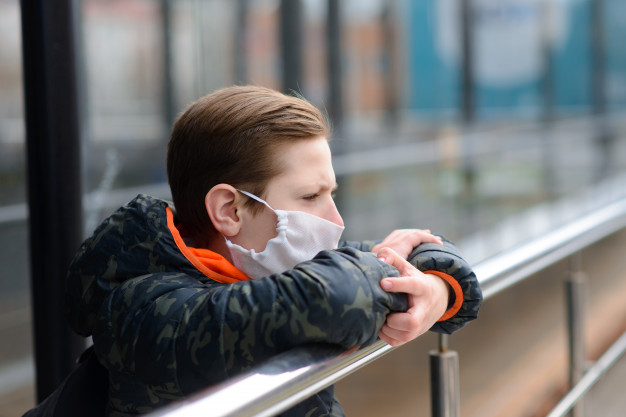The Coronavirus (COVID-19) is spreading across the globe. Washing your hands, covering your mouth and nose with masks and practicing social distancing are some of the effective measures that can prevent the pandemic from spreading further[1].
Wash your hands, cover mouth and nose with masks and practice social distancing to prevent virus spread.
Centers for Disease Control and Prevention
However, managing your mental wellbeing during these times is as important as your overall health. According to WHO, the pandemic is causing psychological distress at individual, family, interpersonal and cultural levels [2]. Feelings of fear, anxiety, sadness, and uncertainty can become triggers for not just people who are already suffering from serious mental illness, but also ones who have already recovered and ones who have underlying symptoms [3].
Fortunately, being proactive with your mind and emotions can help you keep your mental health strong. Understanding what you are going through and the effect it has on your mental wellbeing.
The Coronavirus pandemic can take a toll on your mental health in many ways. A new study published on JAMA Psychiatry shows that there will be an influx of patients into state psychiatric hospitals and local clinics as a result of COVID-19 [4]. However, understanding the reasons and its impact on mental wellbeing can help you take better steps to compact them. Here are some of the major impacts that the pandemic can have on your psychological well being.
Stress
It is anxiety-provoking to learn that an illness such as COVID-19 is spreading across the globe. But, that may not the only issue making you anxious. Financial anxiety, parental stress, and relationship problems are some of the other concerns that might be disturbing your mind. With many rapidly changing regulations and recommendations rolling out, these uncertainties can add up to become a huge toll on your mental health.
Financial anxiety, parental stress and relationship problems can cause upsets in your mental health during lockdown.
Cabin fever
Cabin fever is one of the major psychological concerns that comes with staying inside for an extended period of time. This can lead to restlessness in some and boredom in others. These emotions can eventually cause anxiety disorders and even end up affecting the overall mental health of a person.
Change in routines
Routines help us navigate life easier. These arrangements play a key role in maintaining a healthy mind and body. With almost all of us staying home, our regular routines are disrupted. The lack of structure, changing schedules and the uncertainty of how long this will last can trigger disturbances for many people. It can also cause irregularities in sleep patterns, eating habits and other psychological issues.
Lack of physical activities
From intense work-out sessions to a normal walk to get the train, we all have a fair amount of physical labor no matter what job we have. With social distancing and the lockdown, these opportunities for physical activities are eliminated. Many gyms are also shut down. This can mostly affect those people who exercise regularly for coping with past mental health issues.
Social interactions have always been a vital part of good mental health. The recent social distancing has changed the way we interact with friends, family, coworkers, and even strangers. People who are suffering from depression and anxiety are having a hard time reaching out to support groups and other friends.
What are the warning signs to look out for?
Triggers are psychosocial factors that can create a relapse in people who have recovered from or are undergoing treatment for serious mental health conditions [5]. During stressful times, these triggers can easily intensify the symptoms. Even if your mental health was good prior to the pandemic, you may notice new symptoms emerging.
Mental Health triggers can easily intensify during the pandemic.
In times like these, the best thing to do is to look out for warning signs that can help you identify a possible decline in your mental health. Here are some warning signs to look out for:
Unusual sleeping habits
A quick change in your sleeping habits is perhaps the most obvious warning sign for underlying psychological disturbances. Too much or too little sleep can be both signs of mental illness.
Stress and anxiety are two key factors that can affect your normal sleeping routine [6]. You may find yourself not able to sleep at night or waking up multiple times throughout the night. Some may nap throughout and still have trouble waking up in the morning. Both these issues can be due to some psychological issues and need to be addressed appropriately.
Appetite or weight changes
In distress, people tend to eat more, while some others lose their appetite and eventually their weight. A sudden gain in your weight or losing your appetite drastically can be the sign of your anxiety being too high.
Boredom eating is also a bad eating habit that may develop during self-isolation [7]. Consumption of unhealthy foods to distract oneself can have a negative impact on both mental and physical health.
Difficulty in functioning
Stress and anxiety can make it more difficult for you to concentrate on a task and be productive. The rapidly changing regulations and restrictions due to the pandemic can be one reason for this. The quick change in your routine can also be a factor.
However, if you are having trouble taking care of your daily needs- like taking a shower, doing household chores, or caring for your kids, then your psychological well-being is at risk and may need to take some serious steps to improve it.
What are the steps to manage your mental health during the pandemic?
Taking even the small steps to address your emotional needs can help you cope with psychological issues.
Despite ongoing uncertainties and the many regulations of social distancing, there are many things you can do to improve your mental health. Taking these small steps every day to address your emotional needs can help you cope with many psychological issues.
Engage in physical activities
Physical activities are vital in maintaining good mental health [8]. Find some simple exercises that you can include in your new routine. There are plenty of free apps, videos and fitness communities that can help you find the right one. There are even workouts that does not need any equipment.
Stay connected
Social distancing can take you physically away from your people. However, you can still stay connected with your family, friends, or community through many other ways. Try out some these:
- Using social media platforms, you can chat with your friends and family.
- Find an online support group with more people experiencing similar problems.
- Arrange regular video calls with friends, family members, and co-workers.
- Reach out and support your friends who are in need of social connection.
Manage your media consumption
Staying informed is important. However, too much content about Coronavirus can get into a heightened state of distress. The media gives continuous updates on new cases and deaths. This can greatly trigger mental health problems in individuals.
In order to maintain a healthy media consumption while staying informed, you can follow these steps:
- Don’t watch too many news channels: Limit yourself to watching only a few news programs per day. Avoid visuals or talks that may feel unpleasant for you.
- Be selective about online content: The Internet is now filled with many reports and articles about the pandemic. Filter the content you consume and limit yourself to websites that are trustworthy.
- Use social media wisely: Mindlessly scrolling through your social media page can drain your mental strength. Use the platforms wisely to content with people. Follow people who are more invested in helping, inspiring, and staying positive.
Focus on what you can control
We are all facing a pandemic. Though there are many things that we cannot control during this time, it is important to focus on the things that you can control. You may not be able to help cure the many affected. But, that is okay. You can still help yourself and your family stay healthy and strong.
Staying home, washing your handle when needed and managing your finances are some of the things that only you can do. You may get a lot of free time. Use it to improve yourself or engage in a simple hobby that makes you happy.
Reach out for help and support
You may be going through a lot. But, never get the feeling that you are alone. If you are concerned about your mental health, you can always call your doctor and tell him what you are going through.
There are also many online portals giving therapy. Talking to a licensed mental health professional via phone, video chat, or messaging can also help you reduce your anxiety and improve your mental health









